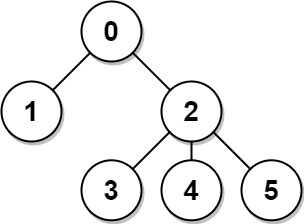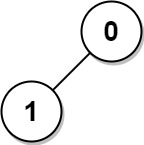LeetCode 834. Sum of Distances in Tree
原题链接在这里:https://leetcode.com/problems/sum-of-distances-in-tree/description/
题目:
There is an undirected connected tree with n nodes labeled from 0 to n - 1 and n - 1 edges.
You are given the integer n and the array edges where edges[i] = [ai, bi] indicates that there is an edge between nodes ai and bi in the tree.
Return an array answer of length n where answer[i] is the sum of the distances between the ith node in the tree and all other nodes.
Example 1:

Input: n = 6, edges = [[0,1],[0,2],[2,3],[2,4],[2,5]] Output: [8,12,6,10,10,10] Explanation: The tree is shown above. We can see that dist(0,1) + dist(0,2) + dist(0,3) + dist(0,4) + dist(0,5) equals 1 + 1 + 2 + 2 + 2 = 8. Hence, answer[0] = 8, and so on.
Example 2:

Input: n = 1, edges = [] Output: [0]
Example 3:

Input: n = 2, edges = [[1,0]] Output: [1,1]
Constraints:
1 <= n <= 3 * 104edges.length == n - 1edges[i].length == 20 <= ai, bi < nai != bi- The given input represents a valid tree.
题解:
Count the sum of distance from one node, then we can simply do a DFS and it takes O(n) time.
For all the nodes, we need O(n^2).
But we can do it with two traversal.
First DFS, bottom up. Update the count of each subtree incluing itself. count[root] += count[child].
And update sum of distance for root, res[root] += res[child] + count[child]. Why? it is like 1 -> 2 -> 3, res[2] = 1, count[2] = 2, res[1] = 3. It contains 1 to 2 and 1 to 3.
Second DFS, top down. Udpate the res for all nodes. If we move root to its child. cound[child] nodes get closer to new root, n - count[child] get further from new root.
Time Complexity: O(n). n is the number of nodes in tree. DFS takes O(n + e). But it is a tree. Thus e = n - 1.
Space: O(n).
AC Java:
1 class Solution { 2 HashSet<Integer>[] tree; 3 int [] res; 4 int [] count; 5 public int[] sumOfDistancesInTree(int n, int[][] edges) { 6 tree = new HashSet[n]; 7 for(int i = 0; i < n; i++){ 8 tree[i] = new HashSet<Integer>(); 9 } 10 res = new int[n]; 11 count = new int[n]; 12 for(int [] e : edges){ 13 tree[e[0]].add(e[1]); 14 tree[e[1]].add(e[0]); 15 } 16 17 dfsCountRes(0, -1); 18 dfsRes(0, -1); 19 return res; 20 } 21 22 private void dfsCountRes(int root, int parent){ 23 for(int i : tree[root]){ 24 if(i == parent){ 25 continue; 26 } 27 28 dfsCountRes(i, root); 29 count[root] += count[i]; 30 res[root] += res[i] + count[i]; 31 } 32 33 count[root]++; 34 } 35 36 private void dfsRes(int root, int parent){ 37 for(int i : tree[root]){ 38 if(i == parent){ 39 continue; 40 } 41 42 res[i] = res[root] - count[i] + count.length - count[i]; 43 dfsRes(i, root); 44 } 45 } 46 }


 浙公网安备 33010602011771号
浙公网安备 33010602011771号